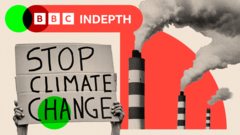In an unprecedented shift at the COP29 climate gathering, concerns over US leadership withdrawal loom large, as China steps forward with a more cooperative stance, showing potential to reshape global climate efforts.
**Shifts in Climate Diplomacy: China's Rising Role as the US Retreats at COP29**

**Shifts in Climate Diplomacy: China's Rising Role as the US Retreats at COP29**
As climate discussions weather turmoil, could China's new cooperation signal a turning tide in global climate diplomacy after the US's expected exit?
---
The recent COP29 climate summit has faced a whirlwind of criticisms, with many delegations echoing sentiments about subpar negotiations characterized by tedious debates and stalled texts. Adding to this uncertainty is the anticipated withdrawal of the United States from international climate discussions, likened to a “disaster” by various negotiators. The US president-elect has branded climate initiatives as fraudulent, further complicating negotiations aimed at navigating the climate crisis.
However, amidst this turmoil, a surprising beacon has emerged: China's evolving stance at the negotiations. Historically oscillating between cooperation and obstruction, China's behavior at this year’s summit marks a drastic departure from previous years. Initial reports reveal increased transparency regarding its climate funding, with China announcing that it has donated over $24 billion to help developing nations tackle climate change since 2016. This revelation was received with optimism and seen as a significant indicator of China's newfound leadership ambition.
Traditionally classified as a developing nation despite its robust economic standing, China has long resisted calls to contribute to funding initiatives aimed at poorer nations, which need a staggering one trillion dollars annually for clean energy transitions. Interestingly, new developments point to China’s increasing involvement in renewable energy projects abroad, notably those funded through its state-offered climate assistance.
Experts suggest this transformation is partly driven by China's booming renewable energy sector, leading global production in solar panels and electric vehicles. As summarized by Professor Michael Jacobs of Sheffield University, the shift in language from China during negotiations reflects a potential claim to climate leadership, aligning closer with terminology typically used by developed countries.
Despite these advancements, complexities remain. China's partnerships in fossil fuel initiatives and attempts to balance relations with other powers in the arena, especially on contentious issues like coal use, underscore ongoing challenges within these negotiations. Still, there’s an optimistic narrative framing China as a crucial player in steering productive dialogue and increasing financial commitments.
Market dynamics further underpin China's strategic push into developing nations, where demand for renewable technologies is surging. The intersection of economic growth and climate action presents both opportunities and responsibilities, encouraging a more engaged role on the world stage.
As the COP29 summit unfolds amid uncertainty, the landscape of climate diplomacy appears poised for alteration. China's potential leap into a leadership role could redefine how global responses to climate change are structured, making the need for collaboration and innovative funding solutions paramount—regardless of the directions taken by historic powers like the US.
The recent COP29 climate summit has faced a whirlwind of criticisms, with many delegations echoing sentiments about subpar negotiations characterized by tedious debates and stalled texts. Adding to this uncertainty is the anticipated withdrawal of the United States from international climate discussions, likened to a “disaster” by various negotiators. The US president-elect has branded climate initiatives as fraudulent, further complicating negotiations aimed at navigating the climate crisis.
However, amidst this turmoil, a surprising beacon has emerged: China's evolving stance at the negotiations. Historically oscillating between cooperation and obstruction, China's behavior at this year’s summit marks a drastic departure from previous years. Initial reports reveal increased transparency regarding its climate funding, with China announcing that it has donated over $24 billion to help developing nations tackle climate change since 2016. This revelation was received with optimism and seen as a significant indicator of China's newfound leadership ambition.
Traditionally classified as a developing nation despite its robust economic standing, China has long resisted calls to contribute to funding initiatives aimed at poorer nations, which need a staggering one trillion dollars annually for clean energy transitions. Interestingly, new developments point to China’s increasing involvement in renewable energy projects abroad, notably those funded through its state-offered climate assistance.
Experts suggest this transformation is partly driven by China's booming renewable energy sector, leading global production in solar panels and electric vehicles. As summarized by Professor Michael Jacobs of Sheffield University, the shift in language from China during negotiations reflects a potential claim to climate leadership, aligning closer with terminology typically used by developed countries.
Despite these advancements, complexities remain. China's partnerships in fossil fuel initiatives and attempts to balance relations with other powers in the arena, especially on contentious issues like coal use, underscore ongoing challenges within these negotiations. Still, there’s an optimistic narrative framing China as a crucial player in steering productive dialogue and increasing financial commitments.
Market dynamics further underpin China's strategic push into developing nations, where demand for renewable technologies is surging. The intersection of economic growth and climate action presents both opportunities and responsibilities, encouraging a more engaged role on the world stage.
As the COP29 summit unfolds amid uncertainty, the landscape of climate diplomacy appears poised for alteration. China's potential leap into a leadership role could redefine how global responses to climate change are structured, making the need for collaboration and innovative funding solutions paramount—regardless of the directions taken by historic powers like the US.



















